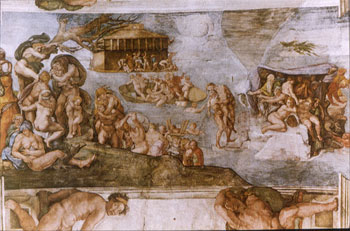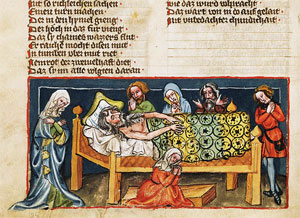When God Was Green: The Original Eco-Covenant
Lent 1B
For Sunday March 5, 2006
Lectionary Readings (Revised Common Lectionary, Year B)
Genesis 9:8–17
Psalm 25:1–10
1 Peter 3:18–22
Mark 1:9–15
Beginning with Ash Wednesday, Christians around the world begin their observance of Lent. Since the fourth century, Christians have observed the 40 week days before Easter as a season of sorrow, reflection, repentance, fasting, abstinence, and acts of mercy. Perhaps you will see a friend this week with ashes conspicuously smeared in the middle of her forehead. Maybe your colleague at work has mentioned giving up chocolate or alcohol. In a culture that encourages indulgence, hubris and bravado, Wednesday's ashes signify a wonderfully and outrageously counter cultural act of humility. As a time when we befriend our brokenness, acknowledge that not all is well with our soul, and lament the pain of so many people in our world, Lent appeals to me as one of the most sensible and brutally realistic liturgical seasons of the year.
The Old Testament reading this week about God's rainbow covenant with Noah seems at first glance to be an odd Scripture for Lent. To complicate matters, the story of Noah's ark has suffered tortured interpretations from divergent viewpoints—as a primitive tale from a pre-historic people, a cute flannel graph for kids, an apologetic for archaeology, geology and meteorology, or an unoriginal flood story similar to epics in other religious traditions, as if the Hebraic tradition has nothing unique to say. The story of Noah reminds me of the Swiss theologian Karl Barth (1886–1968) who when asked whether the snake in the garden of Eden really talked responded, "The important point is not whether the snake spoke, but what he said." Noah informs us of God's interaction with human civilization in ways surprisingly appropriate for Lent.
 |
Noah's ark, Hanna Cheriyan Varghese, Malaysia. |
The first page of the Bible depicts a world created by God, then declared "good" seven times, but which thereafter devolved into violence and chaos—scape-goating by Adam who blamed Eve and even God, fratricide by Cain who murdered Abel, and Lamech's boast that he murdered someone for a slight insult, culminating in the verdict that "the earth was corrupt in God's sight and was full of violence" (Genesis 6:11). After God judged the earth with a flood, He established a covenant or agreement with Noah—"Never again" (a phrase that is repeated five times), God promised, would He judge humanity like He had, "even though every inclination of his heart is evil from childhood" (Genesis 8:21). The scale and scope of the Noahic covenant is as comprehensive and universal as the strained efforts of the writer can describe it. God's covenant extended not only to Noah, his family, and his descendants, but to "all life on earth," "all living creatures of every kind," and even more remarkably to "the earth" itself (Genesis 9:13, 15, 17). God's original eco-covenant extends throughout all time to all space.
"Contemplating the destruction of an entire civilization is disturbing," writes Rabbi Jane Rachel Litman, "and so it should be."1 The Noahic flood story is not about bad things happening to good people, says Litman, but about bad things happening to bad people. You cannot play it both ways. You cannot hope for human justice to bring an abrupt end to the atrocities of a Hitler, Pol Pot or Idi Amin who despoil the earth and wreck violence upon humanity, or complain about bureaucrats who haggle over the nuance of the word "genocide" while millions suffer in Darfur even though we have promised "never again," but then complain when God does exactly that. As if to save us from ourselves, God destroyed a civilization that was "full of violence," not to annihilate it but to redeem it.
 |
The Flood, Michelangelo, Sistine Chapel. |
In his book Collapse (2005), Jared Diamond reminds us that even some of our most advanced and venerable human civilizations do not last forever. The relationship between twelve environmental factors that he isolates, and how humans interacted with them, often determined whether societies collapsed or survived. Today, much of our world pursues a decidedly unsustainable environmental course due to poor human choices. Even worse, a disproportionate share of ecosystem degradation is borne by the very poor who are most impacted by it, those 40% of our fellow human beings who live in "poverty" (1.5 billion people) or "extreme poverty" (the 1 billion people who earn less than $1 a day). Without significant changes, planet earth will exact a heavy price for our choices. At the other end of the socio-economic spectrum, in The World is Flat Thomas Friedman reminds us of the likely consequences of an additional 3 billion nouveau riche, mainly in India and China, who will soon have the economic wherewithal to consume limited resources in the same gluttonous manner that we westerners now do. Beijing alone, for example, now adds 1,000 new cars every day to its streets. The indefinite existence of civilization as we know it is by no means guaranteed.
Theology, as well as science and environmental expertise, ought to inform our motives and choices. A prayer of repentance from the Episcopal Book of Common Prayer encourages us to confess "our waste and pollution of God's creation, and our lack of concern for those who come after us." That is a decidedly Lenten prayer rooted in the story of Noah. If God created the world and called it good, judged it to save it from the ways we violently despoiled it, then made a covenant not only with Noah's family, his descendants, every living creature, all life, and with the very earth itself, then there is no better season than Lent to reaffirm our commitment to creation care. Even some evangelicals have taken positive steps in this regard; 86 of their leaders recently issued an urgent "call to action" in their Evangelical Climate Initiative, despite detractors including James Dobson and Charles Colson.2
 |
The Death of Noah, German, Regensburg, c. 1400–1410, Tempera colors on parchment. |
The first sentence of the Bible invests the earth with inherent and even sacred value, in and of itself: "In the beginning God created the heavens and the earth." He then charged human beings to manage creation as His stewards. That affirmation alone should cause Christians to care deeply about crisises of environment and ecosystems. God's covenant with Noah, verified with the sign of a rainbow, underscores our responsibility. Simple enlightened self-interest also reminds us that all life remains fundamentally dependent upon and an integral part of the ecosystem. Our fate is bound up with the fate of the planet. You might not know know about biomes, eutrophication, or mean trophic levels. I didn't when I read Ecosystems and Human Well-Being: Synthesis. A Report of the Millennium Ecosystem Assessment (Washington, DC: World Resources Institute, 2005). But you don't need to in order to join God in His original eco-covenant to care for all life, every creature, and for the very earth itself.
For further reflection:
* What connections might Christians make between Lenten and environmental themes?
* How have you taken seriously the scientific and theological mandates to care for creation?
* What practical steps might you take to care for creation?
* Consider a bumper sticker I saw: think globally, bike locally.
* For further reflection see Ecosystems and Human Well-Being: Synthesis. A Report of the Millennium Ecosystem Assessment (Washington, DC: World Resources Institute, 2005), along with the two books by Jared Diamond and Thomas Friedman.
[1] http://www.beliefnet.com/story/49/story_4916_1.html.
[2] See Laurie Goodstein, "Evangelical Leaders Join Global Warming Initiative," New York Times, February 8, 2006. http://www.nytimes.com/2006/02/08/national/08warm.html?ex=1139979600&en=c642268e578d997d&ei=5070.





